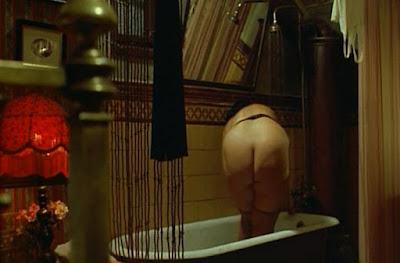November 11, 1995
Underground (1995) *****
At the 1995 Cannes Film Festival, the unbearably pretentious Greek filmmaker Theo Angelopulos made quite an ass of himself when he angrily condemned the jury's decision to award the top fest prize, la Palme d'Or, to Emir Kusturica's ''Underground'', rather than to his own boring, self-important and excruciatingly formalistic piece of cinematic crap, ''Ulysses's Gaze'' (which still undeservedly won the second prize at the fest). Later, ''Underground'' was savagely attacked by influential French intellectuals like Alain Finkielkraut. The attacks were often personal in nature because Emir Kusturica was a Bosnian Muslim who publicly embraced the Serbian side in the ethnic conflict that was then tearing the former Yugoslavia apart (Kusturica later renounced his Muslim roots, and was baptized as an Orthodox Christian). However, the film itself is far less pro-Serb and far more anti-Communist. Kusturica's masterpiece is not only a flamboyant black comedy and a powerful allegory about the tragic history of Yugoslavia, but also a savage indictment of the Communist paranoia, lies, manipulations and dark secrets. The story is simple: during World War II, two Serbian gangsters and arms dealers (Marko and Blacky) join the Communist party and hide from the Gestapo in a huge underground cellar. When the war ends, Marko leaves the cellar and becomes a prominent Communist leader under Tito, while Blacky and his comrades remain underground, still convinced that the war has never ended. Marko continues to lie to them for the next 20 years, keeping them in total ignorance of reality. While Marko is a loyal Communist, Blacky could better be described as a Serbian nationalist. They are only united in their hatred of the Germans. But when Blacky finally emerges from the cellar, he becomes a Milosevic-like war criminal, ethnically cleansing his country of all non-Serbs. The bloody history of Yugoslavia is brilliantly presented in the film in an allegorical, but crystal-clear way. The Communists were gangsters. They managed to suppress their true, fascist nature for a while (keeping it in an underground cellar, so to speak), but it eventually emerged from below and engulfed Yugoslavia in an orgy of ethnic cleansing and genocide. The unjust denunciation of the film as pro-Serb was based solely on its historically accurate depiction (via historical footage) of Croats in Zagreb and Slovenes in Maribor welcoming German troops as liberators. The rest of the film mostly deals with Serb Communists manipulating Serb nationalists, lying to them and exploiting them. It is clear that Kusturica has some sympathy for a Serb nationalist like Blacky (while he has none for a Serb Communist like Marko), but he never denies that Serb nationalists committed horrible atrocities and ethnic cleansing. He just properly assigns the blame for those atrocities. And he correctly blames Communism. Stylistically, Kusturica's film is a flamboyant orgy of dancing, singing, slapstick humour, savage satire and constant celebration. Gypsy music dominates the film, providing an almost drunken sense of jubilation at odds with the devastating events of the film. It's a surrealistic tour de force, at once insightful, frenetic, erotic, farcical and delirious.
Subscribe to:
Comments (Atom)


